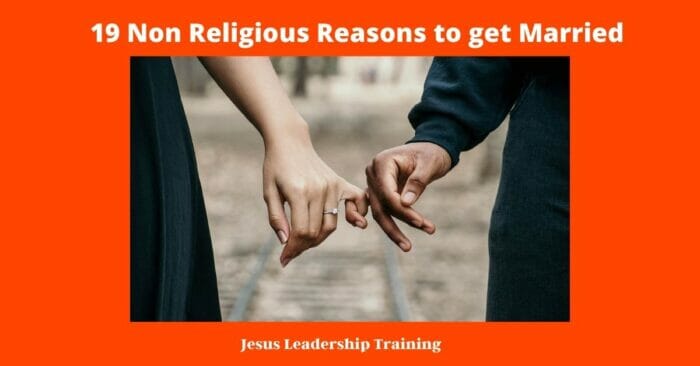Getting married is a big decision. It’s not just about two people committing to each other for the rest of their lives – it’s also about making a public statement that you are committed to this relationship. There are many reasons to get married, and we’re going to explore 19 non religious reasons in this blog post!
Table of Contents
19 Non Religious Reasons to get Married
Though many couples choose to get married for religious reasons, there are a number of secular benefits to tying the knot. For one, marriage can provide financial stability.
In most countries, married couples are entitled to certain tax breaks and government benefits, which can help to reduce the overall cost of living. Additionally, marriage can offer emotional support and security.

In times of difficulty, spouses can lean on each other for comfort and encouragement. Finally, marriages often result in the formation of strong family bonds. Couples who have children typically experience a deeper sense of connection to their extended families, and may even find themselves becoming closer to their in-laws. Non Religious Reasons to get Married
Though there are numerous reasons to get married, ultimately the decision is a personal one. Some of The Bigs ones are;
- Financial Stability
- Tax Benefits
- Security
- Emotional Support
- Property ownership
- Medical support
- Insurance Benefits
- Companionship
- Stability
- Joint Retirement
- Double incomes
- Stable home for Children
- Married people are generally healthier
- Legal and financial benefits
- Tax breaks
- Inheritance
- Social Security and Medicare
- Hospital visitation rights
- Death benefits
Though often associated with religious ceremonies, there are many non-religious reasons to get married. For one, marriage is a legal contract that grants a number of rights and benefits, including the sharing of property, medical decision-making, and spousal support in the event of divorce.

Marriage also confers a number of tax benefits, such as the ability to file joint tax returns and receive a survivor’s benefit from a deceased spouse’s retirement account. In addition, married couples often enjoy discounts on health insurance and other services.
From a practical perspective, then, there are many good reasons to tie the knot. Beyond the legal and financial benefits, marriage also provides a sense of stability and commitment. Studies have shown that married couples are more likely to stick together during tough times than unmarried couples and that they tend to be happier overall.
Marriage can also be good for your health: married people have lower rates of heart disease and arthritis, and they tend to live longer than single people. So whether you’re looking for love or tax breaks, there are plenty of good reasons to say “I do.”
How Mariage helps provide Financial Stability
Marriage has long been touted as a way to provide financial stability, and there is some truth to this claim. In general, married couples are more likely to have higher incomes and accumulate more wealth than their single counterparts.
This is due in part to the fact that two people can pool their resources and earnings, which can lead to greater financial security. Additionally, marriage often comes with certain benefits, such as health insurance and tax breaks, which can further contribute to financial stability.
Of course, marriage is not a guaranteed path to riches, but it can be a solid foundation on which to build a financially secure future.

Marriage has Tax Benefits
Marriage has a number of tax benefits that can save you money. For example, if you and your spouse file a joint tax return, you can combine your incomes and claim a higher standard deduction.
You may also be able to take advantage of the marriage bonus, which allows you to save money by filing as married rather than single. In addition, married couples can transfer property to each other without incurring any gift taxes.
However, it’s important to note that marriage also has some drawbacks from a tax perspective. For instance, if one spouse has a much higher income than the other, it could push the family into a higher tax bracket.
Married couples also cannot take the credit for being head of the household. Nonetheless, on balance, marriage provides more tax benefits than drawbacks.
Marriage also provides Security
Marriage has often been seen as a way to provide financial stability and security, especially for women. In many parts of the world, women were not able to own property or inherit money, so marriage was often their only way to obtain financial security.
Even today, marriage can be a good way to protect your assets and build your wealth. For example, married couples can often qualify for discounts on health insurance and other benefits. In addition, marriage provides legal protections that can be important in the event of divorce or death.
For instance, in many countries, a surviving spouse is automatically entitled to a share of their deceased partner’s estate. While marriage is not right for everyone, it can be a good way to obtain financial security and build assets over time.
Marriage helps provide Emotional Support
Marriage isn’t only a commitment of two people legally bound together, but it’s also an emotional support system. In tough times, whether it be health scares, job insecurities, or family drama, a spouse is always there to help emotionally support their partner.
A recent study done by Brown University found that “individuals who are married have greater life satisfaction, are more likely to describe themselves as ‘very happy,’ and report higher levels of physical health than those who are unmarried.”
The study also found that “married individuals were more likely than nonmarital individuals to say that someone always knows how they are feeling.” marriage not only provides emotional stability and support during difficult periods but also increases an individual’s overall happiness and sense of well-being.
When people are emotionally supported, they feel safer and more secure which allows them to weather any storm.

Marriage shares Property Ownership
One of the biggest decisions you can make in your life is whether or not to get married. Once you tie the knot, you and your spouse are legally obligated to share everything – including your property.
In the eyes of the law, marriage is a contract that binds two people together, and this contract extends to your property ownership. If you own a house or land jointly with your spouse, then both of you have an equal claim to the property.
This means that if you decide to sell the property, you will have to split the proceeds equally between you. If one of you dies, then the other will inherit the property. Therefore, it is important to consider the implications of marriage on your property owner before making any decisions
When you are married you can give each other Medical support
Being married does have some perks when it comes to medical support. Spouses are not only there for the good times, but also for the bad.
When one spouse gets sick, the other is usually there to offer support in any way possible, including helping with medical bills. Many workplaces offer family health insurance plans, which can be used to cover spouses and dependent children.
In addition, married couples can often visit each other in the hospital without having to worry about restrictions on visitors. Finally, spouses can make important medical decisions on behalf of each other if one becomes incapacitated.
While marriage isn’t always easy, it can provide some peace of mind knowing that your partner will be there for you during tough times.
When you are Married Insurance Benefits are Greater and Cheaper
Insurance benefits are generally greater and cheaper when you are married than when you are single. This is because insurers consider married people to be at a lower risk than single people.
They are less likely to get into accidents, and if they do, they are more likely to have someone to help them recover. In addition, married people tend to have healthier lifestyles and better access to healthcare.
As a result, they are less likely to make claims on their insurance policies. Insurers also offer discounts to married couples who take out joint policies. This is because it is easier for them to track the medical history of both spouses and identify any potential risks. As a result, married couples can save money on their insurance premiums.

Marriage can be a great source of Companionship
Marriage is a social institution under which a man and woman establish their relationship as spouses. It is a contract between them, in which they agree to live together and share their possessions and responsibilities.
Marriage provides companionship, financial stability, and sexual fulfillment. It also affords couples the opportunity to raise children together. Some people argue that marriage is no longer necessary because it is not the only source of these benefits. However, marriage offers many benefits that cannot be found in any other relationship.
Marriage provides social, psychological, and economic support for couples. It encourages mutual love and respect, and it gives couples a sense of security and belonging. Marriage also has many legal rights and responsibilities, including the rights to inheritance, property ownership, child custody, and spousal support.
In addition, marriage offers couples the opportunity to build a life together and to share their experiences with each other. For all these reasons, marriage remains an important institution in society.
Marriage can provide Physical Stability
Though often thought of as a purely emotional commitment, marriage can also provide significant physical benefits. Studies have shown that married couples are less likely to suffer from heart disease, obesity, and high blood pressure than unmarried individuals.
Marriage has also been found to reduce stress levels and improve sleep quality. In addition, married couples tend to live longer than single people, due in part to the increased sense of social support and companionship that comes with being married.
While there are many different types of relationships, marriage provides a unique level of physical stability that can be beneficial for both partners.
When you are married you can enjoy Joint Retirement
Once you are married, you and your spouse can start working together on a Joint Retirement Plan. This means that you will each contribute money to the account each month, and the money will grow tax-deferred until you are ready to retire.
There are many benefits to having a Joint Retirement Plan, including the fact that you can both benefit from the tax breaks associated with the account. In addition, if one of you passes away, the other spouse will still have access to the account and can continue to grow it.
Finally, having a Joint Retirement Plan can help to ensure that you both have enough money to live comfortably in retirement.

When you are Married you have the advantage of Double Incomes
It is no secret that money can be a source of stress in any relationship. Whether you are trying to save for a down payment on a house or simply trying to make ends meet, financial concerns can add a lot of strain to a marriage.
However, there is one big advantage to being married: two incomes. When you are single, you have to bear the entire burden of your financial responsibilities. But when you are married, your partner can help to shoulder the load.
In addition, two incomes often mean that you can save more money and make bigger purchases. For example, you may be able to buy a home sooner than you could if you were single. So while money may be a source of tension in marriage, it can also be a big source of strength.
Marriage provides a Stable Home for Children
Marriage has been shown to provide a stable home for children. In fact, children who grow up in homes with married parents are more likely to attend college and are less likely to experience poverty or divorce themselves.
Marriage brings with it a host of benefits that can help children thrive, including economic stability, emotional security, and a greater sense of social support. In addition, married couples are more likely to provide a warm and nurturing environment for their children. research has shown that children who grow up in homes with married parents tend to be happier and healthier than those who do not.
For all these reasons, marriage provides a stable home for children and is an important institution for society as a whole.
Married people are Generally Healthier
There is a growing body of evidence that suggests that married people are generally healthier than those who are not married. One study found that married men were less likely to die from heart disease than unmarried men, and another found that married women were less likely to die from cancer than unmarried women.
There are a number of possible explanations for this link between marriage and health.
First, married people tend to have more social support than those who are not married, which can help them to cope with stress and stay healthy.
Second, married people are more likely to make healthy lifestyle choices, such as eating well and exercising regularly.
Finally, marriage itself may have some positive effects on health, possibly due to the emotional support and commitment that come with it. Whatever the reason, the evidence clearly shows that marriage is good for your health!
The marriage you can leave a greater Inheritance
Unlike cohabiting couples or those in civil partnerships, married couples have greater inheritance rights. In the event that one spouse dies without leaving a will, the surviving spouse is automatically entitled to claim a certain portion of their estate.
This is known as the “elective share.” The elective share can vary from state to state, but it is typically between one-third and one-half of the deceased spouse’s estate. As a result, marriage can provide some financial security in the event of a partner’s death. In addition, married couples can take advantage of certain tax breaks that are not available to other types of couples.
For example, married couples can transfer assets between them without incurring any gift taxes. These benefits can help to ensure that more of a couple’s hard-earned money go to their loved ones instead of the government. As a result, marriage can be an excellent way to leave a greater inheritance for loved ones.
Marriage helps with Social Security and Medicare Benefits
Social Security and Medicare are two important programs that provide benefits to seniors. Seniors who are married may be eligible for higher benefits than those who are single.
For example, a married couple may receive up to 150% of the primary worker’s benefit, while a single senior would only receive 100%. In addition, Medicare benefits are often higher for married couples than for single individuals.
This is because Medicare Part B premiums are based on household income, and married couples usually have a higher household income than single seniors. As a result, marriage can help seniors qualify for higher Social Security and Medicare benefits.
Marriage helps with Hospital Visitation Rights
When you get married, your spouse automatically becomes your next of kin. This has a lot of implications in terms of hospital visitation rights.
If you are in the hospital, your spouse will be able to visit you even if you have not designated them as your power of attorney. This can be crucial if you are in a coma or otherwise unable to make decisions about your care. In addition, your spouse will be able to make decisions about your medical care if you are unable to do so yourself.
This can include things like giving consent for surgery or authorizing the release of information to your family. Marriage provides a lot of legal protections that can be invaluable in a medical emergency.
Marriage Death benefits Include
Marriage provides a number of benefits for couples, including death benefits. If one spouse dies, the surviving spouse is typically entitled to a portion of the deceased spouse’s Social Security benefits.
In addition, the surviving spouse may also be eligible for health insurance coverage through the deceased spouse’s employer. Furthermore, many pension plans provide survivor benefits that allow the surviving spouse to continue to receive payments after the death of the other spouse.
Finally, married couples may also have access to life insurance policies that provide financial protection in the event of a spouse’s death. Death benefits can help to ease the financial burden on a surviving spouse and provide much-needed financial security during a time of grief.
Pros and Cons of Marriage
Some of the major pros of getting Married are;
Pros of Marriage
You will have a lifelong companion:
A study done by the National Institute of Health shows that people who are married live longer than those who are not. This is because you will have someone to help take care of you as you age.
You will be happier:
According to a study done by the University of Chicago, married people are happier than those who are single or divorced. This is because marriage provides companionship and support that can help us weather tough times.
You will have better health:
Marriage has been linked with better physical health, mental health, and overall wellbeing. One reason for this may be that married couples tend to take better care of each other and themselves. They also tend to have more social support, which can help them stay physically and mentally healthy.
You will be financially stable:
Marriage has been linked with financial stability and security. This may be because married couples are able to pool their resources and share expenses. Married couples also tend to make more responsible financial decisions than those who are single.
Cons of Marriage
Some of the major cons of getting married are;
You will have to compromise:
In any relationship, there will be times when you will need to compromise. However, in marriage, you may find yourself compromising more often than you would like. This is because you will need to consider your spouse’s needs and wants as well as your own.
You will have less freedom:
Marriage can be constricting, and you may find yourself with less freedom than you had when you were single. This is because you will need to consider your spouse’s feelings and needs when making decisions.
You may argue more:
It’s no secret that married couples can sometimes find themselves arguing more than they would like. This is because marriage can be stressful, and couples may not always see eye to eye on everything.
You will have to deal with in-laws:
If you get married, you will also be marrying into your spouse’s family. This means that you will need to deal with their parents, siblings, and other relatives. While some families are great, others can be difficult to deal with.
Overall, there are both pros and cons to getting married. It’s important to weigh these carefully before making a decision. Marriage is a big step, and it’s not right for everyone. However, if you do decide to get married, it can be a very rewarding experience.
Final Thoughts – Non-religious Reasons to Get Married
There are many pluses to getting married that have nothing to do with religion. If you are thinking about taking the plunge, be sure to weigh the pros and cons carefully before making a decision. Marriage is a big step, but it can be a very rewarding one.
God Bless Greg



